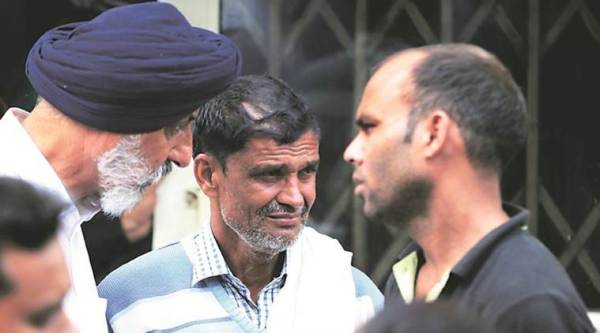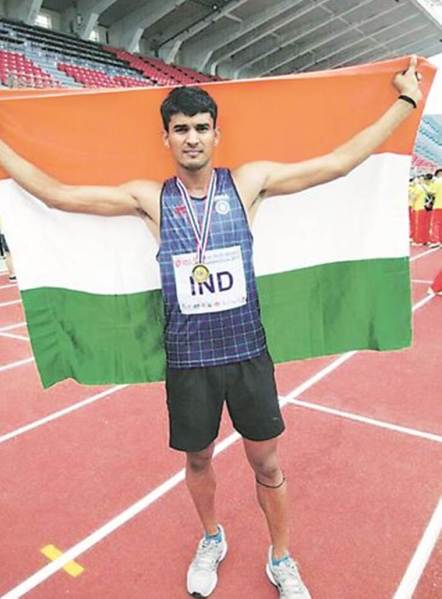 “He was my only son. I used to give him money every month. He also trained yesterday. He called me at 5 pm and told me he had a headache,” Pal said.
“He was my only son. I used to give him money every month. He also trained yesterday. He called me at 5 pm and told me he had a headache,” Pal said.
PALENDRA CHAUDHARY, the 18-year-old athlete who committed suicide at the Sports Authority of India (SAI) academy inside the Jawaharlal Nehru Stadium in Delhi Tuesday, had recently appeared for trials with the Army in Jabalpur and the IAF in Hindon.
Police and Chaudhary’s family are yet to find out why the promising sprinter, who won gold in the men’s relay at the 2017 Asian Youth Championships in Bangkok, took his own life in his hostel room after training at the JLN Stadium Tuesday.
According to Chaudhary’s coaches and fellow athletes, he was slowly getting back to his full training regimen following a break after undergoing a tattoo removal procedure to erase a symbol of the Olympic rings near his elbow. He was aiming to qualify for the Asian Championships next year and wanted to meet the qualifying norms at the next edition of the Federation Cup.
“He had a trial with the Indian Army at Jabalpur, and was asked to remove the tattoo, following which he was advised rest and could only manage to jog,” said Harkamaljeet Singh, his coach.
 SAI said that Chaudhary attempted to kill himself by hanging from a ceiling fan in his hostel room. (Express photo by Amit Mehra)
SAI said that Chaudhary attempted to kill himself by hanging from a ceiling fan in his hostel room. (Express photo by Amit Mehra)
On Wednesday, the morning after Chaudhary’s body was found hanging from the ceiling fan of his room, his family, friends and coaches were struggling to cope with the loss.
“I have lost one of my best athletes and we still don’t know why he took this step,” his coach said.
In an official statement, SAI said that Chaudhary attempted to kill himself by hanging from a ceiling fan in his hostel room. Chaudhary’s sister who had come to visit him, and other athletes, raised an alarm after realising that he was alive and rushed him to Safdarjung Hospital, it said. He died in the hospital Tuesday. “There was no suicide note, and the cause of death will be ascertained after the post-mortem,” Additional Deputy Commissioner of Police (south) Vijayanta Arya said.
SAI D-G Neelam Kapur said that an internal enquiry has been ordered into the death. “The enquiry will be headed by SS Chhabra, secretary SAI. The enquiry officer will speak to all people concerned — coaches, other athletes and his family members, especially his sister who had come to visit him that evening, to understand what may have led him to take this extreme step. This is a very sad turn of events and we are extending all support to the family. Arrangements are being made to send the body to Aligarh for his last rites,” Kapur said.
Chaudhary’s father Mahesh Pal, a farmer from Aligarh, said that the last time he spoke to his son in detail, the athlete asked for Rs 15,000 to meet his monthly expenses. “I promised to give him the money at the start of the month. He was my only son. I used to give him money every month. He also trained yesterday. He called me at 5 pm and told me he had a headache,” Pal said.
Chaudhary’s fellow athlete, long-jumper Kuldeep, said, “Palendra was aiming to run faster. He wanted to participate in the Federation Cup next year.”
Chaudhary’s former trainer Ajit Kumar, who brought him to Delhi where he shifted from long jump to sprint, said: “He won state, national, inter-zone and international events. How a gifted athlete can kill himself is beyond us.”
After setting an under-16 record of 11.10 seconds in the 100 metres, Palendra was selected by SAI to be part of the academy in 2016. However, after the high at Bangkok, Chaudhary suffered a couple of setbacks.
“He was selected for the World U18 Youth Championships in Nairobi in July but he could not win a medal,” Singh, the coach, said. Earlier this year, the athlete had won gold at the senior state meet in Meerut but was disqualified for a false start.
Akshay Jain, who was part of the relay team in Bangkok, said: “He was among the best junior athletes… his fearless attitude set him apart.”